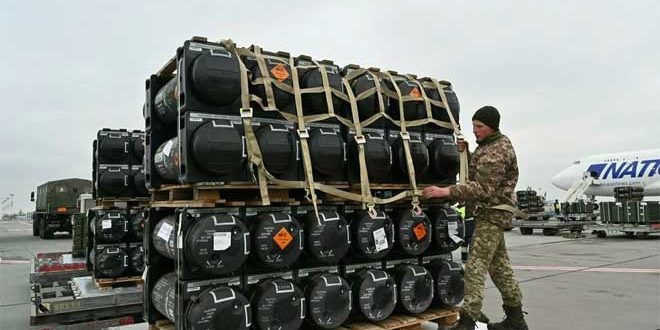New York, April.4,(ST) – American weapons manufacturers do not benefit directly from the thousands of missiles, drones and other weapons sent to Ukraine, but they stand to gain in the long run by supplying countries willing to strengthen their defenses against Russia.
Like other Western nations, the United States has turned to its own stockpiles to supply Ukraine with shoulder-mounted Stinger and Javelin missiles, for example. These weapons from Lockheed-Martin and Raytheon Technologies were paid for some time ago.
The Pentagon plans to use $3.5 billion earmarked for this purpose in a spending bill approved in mid-March, a defense ministry spokesman told AFP.
The Javelin anti-tank missile is manufactured by a joint venture between Lockheed and Raytheon. The latter’s Stinger anti-aircraft missile had ceased production until the Pentagon ordered $340 million for it last summer.
“We are exploring options to more quickly replenish U.S. stockpiles and replenish depleted stocks from allies and partners,” the spokesperson said.
“It will take time to revive the industrial base – at major suppliers and subcontractors – to allow production to resume,” he added.
The profits that companies derive from these missiles, which are known to be simple to use, will not be really staggering, defense industry experts told AFP.
“If 1,000 Stingers and 1,000 Javelins are shipped to Eastern Europe every month for next year, which is not unlikely given the current pace, in our view we believe that would equate to 1 in $2 billion in revenue for both program makers, which is significant,” said Colin Scarola of CFRA, an investment research firm.
Raytheon’s and Lockheed’s revenues last year exceed that amount, however: $64 billion and $67 billion, respectively.
“Raytheon probably made more money selling a Patriot missile system to Saudi Arabia than making Stinger missiles,” said Jordan Cohen, an arms sales specialist at the Cato Institute.
“They’re just going to put so much effort into producing these not-so-precious weapons,” Cohen told AFP.
Lockheed, Raytheon and another gunsmith, Northrop Grumman, did not respond to requests from AFP.
General Dynamics said it had not raised its financial outlook since January, while Boeing just said it was up to governments to decide how to spend the money earmarked for defence.
Some arms maker executives hinted in the latest quarterly earnings release at the end of January that the situation in the world would benefit them.
Greg Hayes, CEO of Raytheon, said rising tensions in Asia, the Middle East and Eastern Europe will lead to increased international sales – not right away but later in 2022 and beyond.
His Lockheed-Martin counterpart, James Taiclet, said he’s seen “renewed great-power competition” that could trigger an increase in U.S. military spending.
“The war in Ukraine is reshaping the geopolitical order in a way that hasn’t really been seen in the last 30 years,” said Burkett Huey of Morningstar, a financial services company.
Source: AFP

